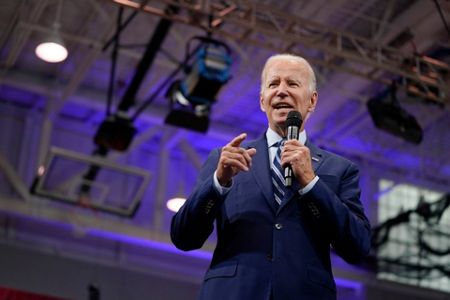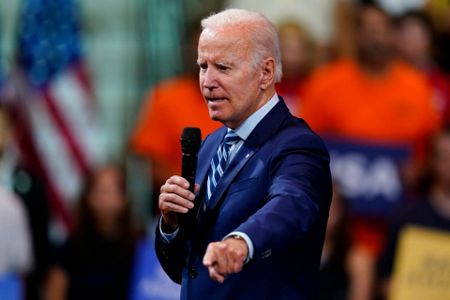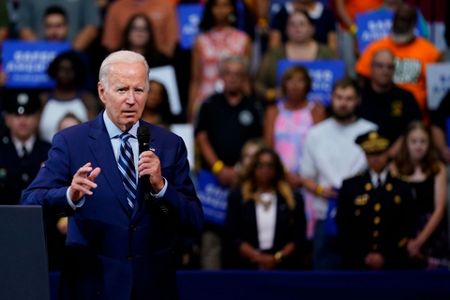WASHINGTON (AP) — Nearly two years after he defeated Donald Trump, President Joe Biden has some unfinished business he’s aiming to settle with the restive forces of Trumpism.
The president is set to use a primetime address Thursday to frame the upcoming midterm elections as part of an ongoing battle for the “soul of the nation” — a reprise of his 2020 campaign theme that he's now using to cast the current stakes in as dire terms as those that sent him to the Oval Office two years ago.
Biden, who largely avoided even referring to “the former guy” by name during his first year in office, has grown increasingly vocal in calling out Trump personally, which White House officials say reflects the urgency with which he views the threat of Trump and his devotees.
His speech at Independence Hall in Philadelphia, less than 10 weeks before the midterms, comes as Biden is feeling emboldened by a series of legislative wins. He is sharpening his attacks on Republicans as the “ultra-MAGA” party — a reference to Trump’s “Make America Great Again” campaign slogan — that opposes his agenda, embraces conservative ideological proposals and spreads Trump’s false claims about the 2020 election.
“What we’re seeing now is either the beginning or the death knell of an extreme MAGA philosophy,” Biden told Democrats at a Maryland fundraiser last week. “It’s not just Trump, it’s the entire philosophy that underpins the — I’m going to say something, it’s like semi-fascism.”
In his Thursday address, White House officials said, Biden will hark back to the 2017 white supremacist protest in Charlottesville, Virginia, which he says brought him out of political retirement to challenge Trump. He'll argue that the country faces a similar crossroads in the coming months.
“The president thinks that there is an extremist threat to our democracy,” said White House press secretary Karine Jean-Pierre on Wednesday. “It's not stopping. It's continuing.”
Biden allies stressed that while the president was set to condemn “ultra-MAGA” Republicans, he was not rejecting the entirety of the GOP and would use his remarks to call on traditional Republicans to join him in condemning Trump and his adherents. Still, he faces a balancing act, as more than 74 million Americans voted for Trump in 2020.
“I respect conservative Republicans,” Biden said last week. “I don’t respect these MAGA Republicans.”
Larry Diamond, an expert on democracy and senior fellow at the Hoover Institution at Stanford University, said Biden faces a difficult situation as he confronts Trump. Calling him out for attacks on democracy "can be manipulated or framed as being partisan. And if you don’t call it out, you are shrinking from an important challenge in the defense of democracy.”
“Wishing it away, or shrinking away from the challenge out of fear of appearing partisan will do no good in my view,” he said. “The threats are too grave and too imminent.”
Even this week, Trump was posting on his beleaguered social media platform about overturning the 2020 election results and holding a new presidential election, which would violate the Constitution.
Timothy Naftali, a presidential historian at New York University, said it’s not unusual for there to be tension between a president and his successor, but it’s “unprecedented for a former president to be actively trying to undermine the U.S. Constitution.”
“The challenge that President Biden faces is to get on with his agenda while still doing what he needs to uphold the Constitution,” Naftali said. “That’s not easy.”
The White House has assiduously tried to keep the president removed from the legal and political maelstrom surrounding the Department of Justice’s discovery of classified documents in Trump's Florida home. Biden has taken advantage of some Republicans’ reflexive condemnation of federal law enforcement.
“You can’t be pro-law enforcement and pro-insurrection,” Biden said Tuesday in Wilkes Barre, Pennsylvania. “I’m opposed to defunding the police,” he added. “I’m also opposed to defunding the FBI.”
Biden's appearance is being billed as an official, taxpayer-funded event, a mark of how the president views defeating the Trump agenda as much as a policy aim as a political one. The major broadcast television networks are not expected to carry the address live.
Jean-Pierre said Biden was holding the event in prime time because he believes “we need to save the core values of our of our country.”
“They just don’t respect the rule of law,” she said of “MAGA Republicans.” “And they are pursuing an agenda that takes away people’s rights.”
House Minority Leader Kevin McCarthy announced he would speak in Scranton, Pennsylvania, on Thursday afternoon on “Biden's assault on the soul of America," accusing the president of planning to “continue to disparage hard-working Americans.”
" Joe Biden is the divider-in-chief and epitomizes the current state of the Democrat Party: one of divisiveness, disgust, and hostility towards half the country,” said RNC Chairwoman Ronna McDaniel.
Biden's trip to Philadelphia will be one of three presidential visits to the state within a week, a sign of its importance in the midterms, with competitive Senate and governor's races. Trump will have a rally there this weekend.
The White House hopes to use the Philadelphia speech to unite familiar themes of Biden’s presidency under one banner: holding out bipartisan legislative wins on guns and infrastructure as evidence that democracies “can deliver,” pushing back on “extreme” GOP policies on guns and abortion that are out of step with most people's views, and rejecting efforts to undermine confidence in the nation’s election or diminish its standing abroad.
“The contrast is clear, While the MAGA wing has really focused on weakening the guardrails of our democracy to undermine the will of the people, the president is fighting to defend our democracy, while also delivering real results for working families,” said Danielle Melfi, executive director of Building Back Together, which coordinates messaging among Democratic groups on behalf of the White House.
Biden, she said, was expected to “lay out how that contrast ripples across every issue top of mind for voters” from abortion to guns to ensuring American elections remain free and fair.
The challenges to democracy have only multiplied since the tumult surrounding the 2020 presidential election.
Lies surrounding the 2020 election have triggered a wave of harassment and death threats against state and local election officials and new restrictions on mail voting in Republican-dominated states. County election officials have faced pressure to ban the use of voting equipment, efforts generated by conspiracy theories that voting machines were somehow manipulated to steal the election.
Candidates who dispute Trump’s loss have been inspired to run for state and local election posts, promising to restore integrity to a system that has been undermined by false claims and conspiracy theories. Some have claimed widespread fraud and supported efforts to decertify Biden’s win.
There is no evidence of any widespread fraud or manipulation of voting machines. Judges, including ones appointed by Trump, dismissed dozens of lawsuits filed after the election and Trump’s own attorney general has called the claims bogus. Yet AP-NORC polling has shown about two-thirds of Republicans say they do not think Biden was legitimately elected president in 2020.
Heading into the November midterms, election officials face not only the threat of foreign interference but also ransomware, politically motivated hackers and insider threats. Over the last year, security breaches have been reported at a small number of local election offices in which authorities are investigating whether office staff improperly accessed or provided improper access to sensitive voting technology.
___
AP writer Christina A. Cassidy in Atlanta contributed to this report.
Copyright 2022 The Associated Press. All rights reserved. This material may not be published, broadcast, rewritten or redistributed without permission.







